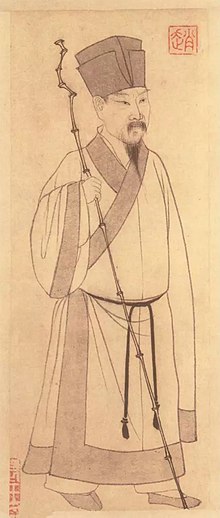苏轼
| Su Shi | |
|---|---|

Portrait of Su Dongpo by Zhao Mengfu
|
|
| Born | 19 December, 3rd Year in the Jingyou era of Emperor Renzong of Song 8 January 1037 Meishan, Sichuan, Northern Song Dynasty |
| Died | 28 July, 1st Year in the Jianzhongjingguo era of Emperor Huizong of Song 24 August 1101 (aged 64) Changzhou |
| Occupation | Minister of Rites, Poet, Essayist, Painter, Calligrapher, |
| Notable work |
Former and Latter Odes on the Red Cliffs () The Cold Food Observance () |
| Parent(s) | (father) |
| Relatives | Su Zhe (brother) |
| Su Shi | |||||||||||||||||||||||||||||||||||

"Su Shi" in traditional (top) and simplified (bottom) Chinese characters
|
|||||||||||||||||||||||||||||||||||
| Traditional Chinese | |||||||||||||||||||||||||||||||||||
|---|---|---|---|---|---|---|---|---|---|---|---|---|---|---|---|---|---|---|---|---|---|---|---|---|---|---|---|---|---|---|---|---|---|---|---|
| Simplified Chinese | |||||||||||||||||||||||||||||||||||
|
|||||||||||||||||||||||||||||||||||
| Zizhan | |||||||||||||||||||||||||||||||||||
| Chinese | |||||||||||||||||||||||||||||||||||
| Literal meaning | Little Forward-Looking One | ||||||||||||||||||||||||||||||||||
|
|||||||||||||||||||||||||||||||||||
| Dongpo Jushi | |||||||||||||||||||||||||||||||||||
| Traditional Chinese | |||||||||||||||||||||||||||||||||||
| Simplified Chinese | |||||||||||||||||||||||||||||||||||
| Literal meaning | East Slope Householder | ||||||||||||||||||||||||||||||||||
|
|||||||||||||||||||||||||||||||||||
| Su Dongpo | |||||||||||||||||||||||||||||||||||
| Traditional Chinese | |||||||||||||||||||||||||||||||||||
| Simplified Chinese | |||||||||||||||||||||||||||||||||||
|
|||||||||||||||||||||||||||||||||||
Su Shi (8 January 1037 – 24 August 1101), also known as Su Dongpo, was a Chinese writer, poet, painter, calligrapher, pharmacologist, gastronome, and a of the Song dynasty. A major personality of the Song era, Su was an important figure in Song Dynasty politics, aligning himself with Sima Guang and others, against the New Policy party led by Wang Anshi. Su Shi was famed as an essayist, and his prose writings lucidly contribute to the understanding of topics such as 11th-century Chinese travel literature or detailed information on the contemporary Chinese iron industry. His poetry has a long history of popularity and influence in China, Japan, and other areas in the near vicinity and is well known in the English-speaking parts of the world through the translations by Arthur Waley, among others. In terms of the arts, Su Shi has some claim to being "the pre-eminent personality of the eleventh century."Dongpo pork, a prominent dish in Hangzhou cuisine, is named in his honor.
Su Shi was born in Meishan, near Mount Emei today Sichuan province. His brother Su Zhe and his father Su Xun were both famous literati. Su's early education was conducted under a Taoist priest at a local village school. Later his educated mother took over . Su married at the age of 17. Su and his younger brother (Zhe) had a close relationship, and in 1057, when Su was 19, he and his brother both passed the (highest-level) civil service examinations to attain the degree of jinshi, a prerequisite for high government office. His accomplishments at such a young age attracted the attention of Emperor Renzong, and also that of Ouyang Xiu, who became Su's patron thereafter. Ouyang had already been known as an admirer of Su Xun, sanctioning his literary style at court and stating that no other pleased him more. When the 1057 jinshi examinations were given, Ouyang Xiu required—without prior notice—that candidates were to write in the ancient prose style when answering questions on the Confucian classics. The Su brothers gained high honors for what were deemed impeccable answers and achieved celebrity status, especially in the case of Su Shi's exceptional performance in the subsequent 1061 decree examinations.
...
Wikipedia
